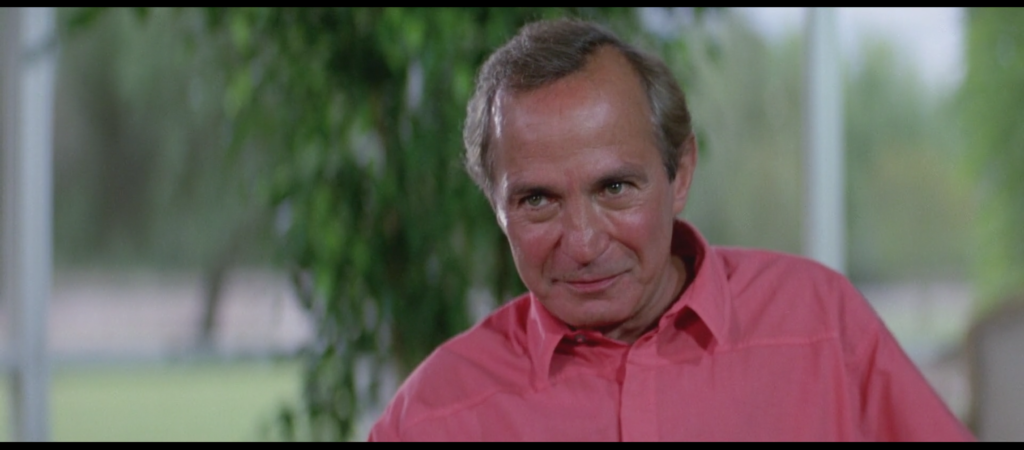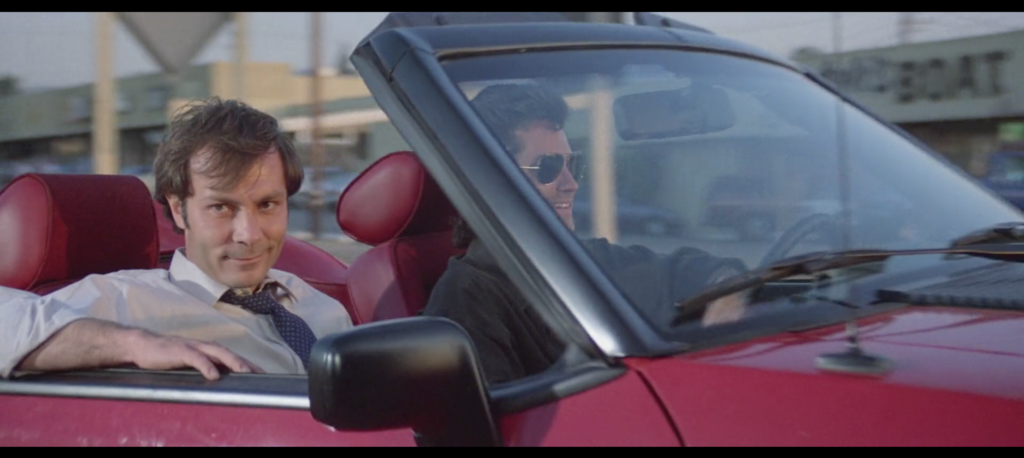“Dalton,” Brad Wesley says. “I have a cousin in Memphis. Tells me you killed a man down there. Tells me you said it was self defense at the trial. But you and I know that isn’t so, don’t we.” Even in a scene as cockamamie as the Breakfast Conference, this series of statements makes an impact.
First and foremost it confirms what to this point had only been treated as part of Dalton’s cooler legendarium—a potential tall tale about ripping a man’s throat out with his bare hands that Hank relates to Horny Steve, and that Horny Steve rejects as bullshit out of hand. Wesley doesn’t mention the unusual method of dispatch at all, as the details do not concern him. What does concern him is that, in his own estimation anyway, he is up against a) a killer, and b) a liar. The former tells him Dalton can be useful; the latter tells him Dalton may be willing to be used.
Second, it shows us that despite all his sangfroid, Dalton does indeed have nerves that can be hit and buttons that can be pushed. He neither confirms nor denies Wesley’s cousin’s report, and a closeup reveals his reaction as muted. It’s only when Wesley claims that the self-defense justification was bullshit that Dalton gets up from his chair, preparing to storm off. Wesley preceded this story by arguing that of course Dalton loves beating people up for cash, that this is both his nature and human nature in general. Telling Dalton this story about his own life, then intimating that they can both sense the truth lurking under the surface, is Wesley’s attempt at turning him into a co-conspirator on this point. Wesley sees a useful man, he concludes that this man may consent to being used, he attempts to paint him into a corner in which he’s being used already, in which his use is a fait accompli. It’s rather deftly done, and that it leaves us not fully sure to what part of Wesley’s version of events Dalton objects is deft as well.
Third, it’s a pleasure to listen to, bearing many of the hallmarks of Road House‘s finest line readings. Ben Gazzara’s voice is a rollercoaster of subtle modulation, a miniature Bleeder Speech. “Dalton” is delivered in his best we are reasonable men, you and I; come, let us reason together voice. “I have a cousin in Memphis” is flatly factual. “Tells me you killed a man down there” swoops upward in register, as if he’s relating an interesting factoid from a wikipedia page he’s reading as he and Denise sit next to each other on the couch after dinner looking at their phones. “Tells me you said it was self defense at the trial” has a conclusory feel to it: Ah, well, that settles that. Then the verbal killshot: “But you and I know that isn’t so, don’t we.” His voice shifts to a level lower than in conclusion, revealing the deeper truth. Despite the sentence construction, this is, in that go-to maneuver of Road House rhetoric, not a question but a statement. They know. They both know.
Fourth…Brad Wesley has a cousin in Memphis.
It’s not the first time Wesley has alluded to family even within this scene; there’s his asshole grandfather, his only sister, and of course his only sister’s son Pat McGurn. (Not to mention his bastard son Jimmy, and no I will not be providing documentation.) So there’s precedent here—just not, more broadly speaking, within the world of action-movie archvillains. I don’t recall any other cousin relationships factoring into the mental landscapes of the big bads of ’80s and ’90s murder-spectacle movies, so this is something of an anomaly.
But how much does this cousin factor into that landscape? Let us first assume the cousin actually exists and is not simply a convenience concocted by Wesley to preserve the integrity of his intelligence network. Do they speak regularly? Does Brad give him or her (pronouns are dropped here, perhaps strategically) the occasional call just to say hello, or vice versa?
If so, how did Dalton come up? Did Wesley happen to mention the name of the new bouncer in town? Was the plight of their mutual relation Pat McGurn the topic at hand?
Or was it brought up deliberately? Did Wesley know some of Dalton’s past haunts, perhaps via the barfolk network into which his goons Morgan and Pat had been plugged for years? Did the cousin hear that a local figure of ill repute had traveled to good ol’ Brad’s stomping grounds?
And who is the cousin? Is it simply some unnamed, offscreen figure, concocted by the writers as a device for relaying this crucial bit of backstory? Or is it someone we’ve met? Someone who figures briefly into the film before this conversation and then returns whence he came to hear Beale Street talk? Someone we witness in Wesley’s company—at his pool party, in his driveway during a postmortem confab about the failed mission to secure reemployment for Brad’s nephew and his own first cousin once removed Pat McGurn, at a subsequent intra-family mission to intimidate Brad’s ex-uncle-in-law Red Webster—who then relays this information offscreen, says goodbye, and then is never seen again?
Tags: brad wesley, karpis, memphis, road house


